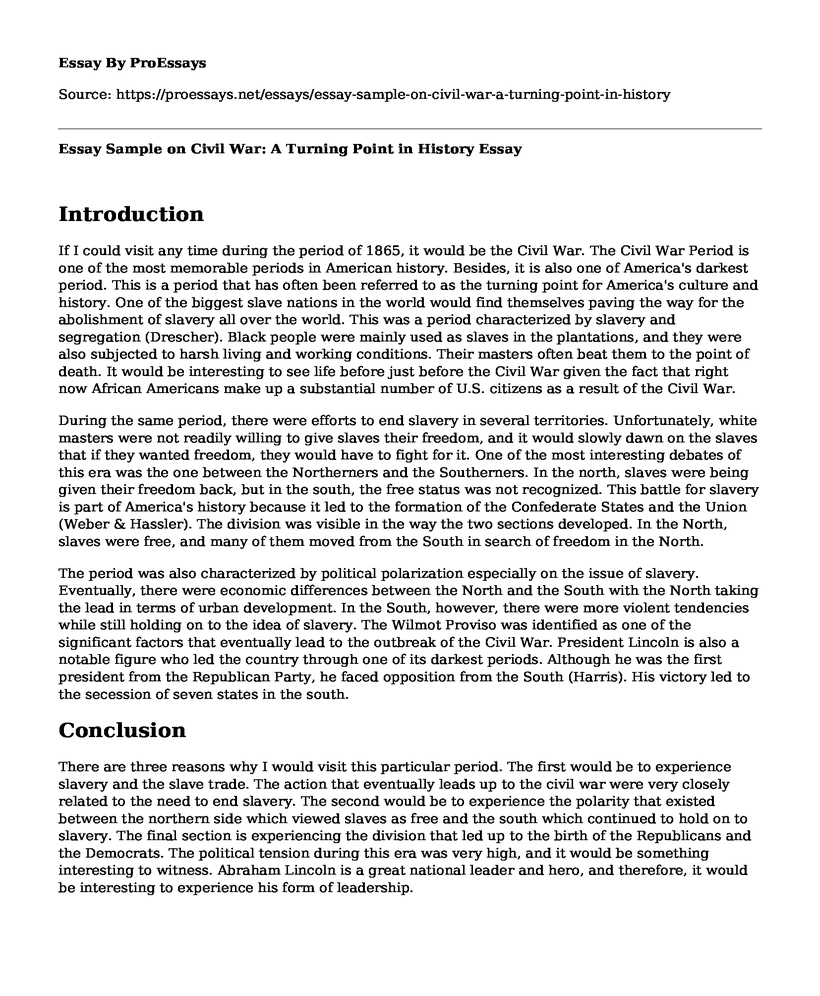Introduction
If I could visit any time during the period of 1865, it would be the Civil War. The Civil War Period is one of the most memorable periods in American history. Besides, it is also one of America's darkest period. This is a period that has often been referred to as the turning point for America's culture and history. One of the biggest slave nations in the world would find themselves paving the way for the abolishment of slavery all over the world. This was a period characterized by slavery and segregation (Drescher). Black people were mainly used as slaves in the plantations, and they were also subjected to harsh living and working conditions. Their masters often beat them to the point of death. It would be interesting to see life before just before the Civil War given the fact that right now African Americans make up a substantial number of U.S. citizens as a result of the Civil War.
During the same period, there were efforts to end slavery in several territories. Unfortunately, white masters were not readily willing to give slaves their freedom, and it would slowly dawn on the slaves that if they wanted freedom, they would have to fight for it. One of the most interesting debates of this era was the one between the Northerners and the Southerners. In the north, slaves were being given their freedom back, but in the south, the free status was not recognized. This battle for slavery is part of America's history because it led to the formation of the Confederate States and the Union (Weber & Hassler). The division was visible in the way the two sections developed. In the North, slaves were free, and many of them moved from the South in search of freedom in the North.
The period was also characterized by political polarization especially on the issue of slavery. Eventually, there were economic differences between the North and the South with the North taking the lead in terms of urban development. In the South, however, there were more violent tendencies while still holding on to the idea of slavery. The Wilmot Proviso was identified as one of the significant factors that eventually lead to the outbreak of the Civil War. President Lincoln is also a notable figure who led the country through one of its darkest periods. Although he was the first president from the Republican Party, he faced opposition from the South (Harris). His victory led to the secession of seven states in the south.
Conclusion
There are three reasons why I would visit this particular period. The first would be to experience slavery and the slave trade. The action that eventually leads up to the civil war were very closely related to the need to end slavery. The second would be to experience the polarity that existed between the northern side which viewed slaves as free and the south which continued to hold on to slavery. The final section is experiencing the division that led up to the birth of the Republicans and the Democrats. The political tension during this era was very high, and it would be something interesting to witness. Abraham Lincoln is a great national leader and hero, and therefore, it would be interesting to experience his form of leadership.
Works Cited
Drescher, Seymour. Abolition: a history of slavery and antislavery. Cambridge University Press, 2009.
Harris, William C. "His Loyal Opposition: Lincoln'S Border States' Critics." Quod.Lib.Umich.Edu, 2011, https://quod.lib.umich.edu/j/jala/2629860.0032.103/--his-loyal-opposition-lincolns-border-states-critics?rgn=main;view=fulltext. Accessed 5 May 2019.
Weber, Jennifer L., and Warren W. Hassler. "American Civil War | Causes, Definition, History, & Facts." Encyclopedia Britannica, 2019, https://www.britannica.com/event/American-Civil-War. Accessed 5 May 2019.
Cite this page
Essay Sample on Civil War: A Turning Point in History. (2023, Jan 09). Retrieved from https://proessays.net/essays/essay-sample-on-civil-war-a-turning-point-in-history
If you are the original author of this essay and no longer wish to have it published on the ProEssays website, please click below to request its removal:
- The Depression and the American Culture Essay
- Essay on St. Francis of Assisi, Founder of the Franciscan Order
- Contradictions of the 1920s: Roaring Twenties Essay
- Essay Sample on Cold War: Leadership of President Dwight Eisenhower
- Ancient Greek Homosexuality: The Pederastic Relationship - Essay Sample
- Essay Sample on Modern Wars: Russo-Japanese War & WWI Tactics & Weapons
- Nat Turner: A Slave Rebellion Leader - Essay Sample







